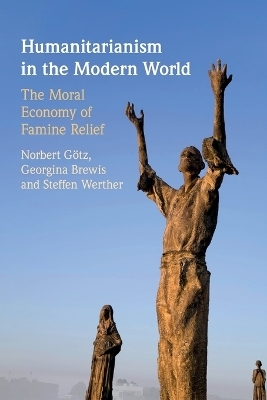
Humanitarianism in the Modern World
Cambridge University Press (Verlag)
978-1-108-73737-1 (ISBN)
This is an innovative new history of famine relief and humanitarianism. The authors apply a moral economy approach to shed new light on the forces and ideas that motivated and shaped humanitarian aid during the Great Irish Famine, the famine of 1921-1922 in Soviet Russia and the Ukraine, and the 1980s Ethiopian famine. They place these episodes within a distinctive periodisation of humanitarianism which emphasises the correlations with politico-economic regimes: the time of elitist laissez-faire liberalism in the nineteenth century as one of ad hoc humanitarianism; that of Taylorism and mass society from c.1900-1970 as one of organised humanitarianism; and the blend of individualised post-material lifestyles and neoliberal public management since 1970 as one of expressive humanitarianism. The book as a whole shifts the focus of the history of humanitarianism from the imperatives of crisis management to the pragmatic mechanisms of fundraising, relief efforts on the ground, and finance. This book is also available as Open Access on Cambridge Core.
Norbert Götz is a Professor at the Institute of Contemporary History, Södertörn University, Sweden. He is the author of Deliberative Diplomacy (2011) and Ungleiche Geschwister (2001), for which he has been awarded with the Hans-Rosenberg-Memorial-Prize. Georgina Brewis is Associate Professor at University College London. Her previous publications include A Social History of Student Volunteering (2014), English Teachers in a Postwar Democracy (2014) and The World of UCL (2018). Steffen Werther is Associate Professor at the Institute of Contemporary History at Södertörn University. His publications include SS-Vision und Grenzland-Realität (2012).
List of Tables; List of Figures; Acknowledgements; List of Abbreviations; Introduction; 1. Famine Relief in Perspective; 1.1 Social Origins of Famine; 1.2 The Moral Economy of Aid; 2. Case Studies; 2.1 Three Ages of Humanitarianism; 2.2 The Great Irish Famine and Ad Hoc Humanitarianism; 2.3 The Russian Famine of 1921–3 and Organised Humanitarianism; 2.4 Famine in Ethiopia 1984–6 and Expressive Humanitarianism; 3. Appeals; 3.1 The Humanitarian Appeal; 3.2 Empire, Faith, and Kinship – Ireland; 3.3 Altruism, Self-Interest, and Solidarity – Soviet Russia; 3.4 Television, Shame, and Global Humanity – Ethiopia; 3.5 Arousing Compassion: A Long View on Calls for Famine Relief; 4. Allocation; 4.1 Allocating Gifts; 4.2 Fostering Local Efforts – Ireland; 4.3 Live and Let Die – Soviet Russia; 4.4 Relief, Rehabilitation, and Resettlement – Ethiopia; 4.5 Targeting Aid: Realities on the Ground across Two Centuries; 5. Accounting; 5.1 Humanitarian Accountability; 5.2 Figures, Narratives, and Omissions – Ireland; 5.3 The Power of Numbers – Soviet Russia; 5.4 More than 'Dollars' and 'Per Cent' – Ethiopia; 5.5 Keeping the Record: A Bicentennial Perspective; Conclusion: The Moral Economy of Humanitarianism; List of References; Index.
| Erscheinungsdatum | 24.10.2022 |
|---|---|
| Zusatzinfo | Worked examples or Exercises |
| Verlagsort | Cambridge |
| Sprache | englisch |
| Maße | 152 x 228 mm |
| Gewicht | 550 g |
| Themenwelt | Geisteswissenschaften ► Geschichte ► Allgemeine Geschichte |
| Geschichte ► Teilgebiete der Geschichte ► Kulturgeschichte | |
| Sozialwissenschaften ► Soziologie | |
| ISBN-10 | 1-108-73737-4 / 1108737374 |
| ISBN-13 | 978-1-108-73737-1 / 9781108737371 |
| Zustand | Neuware |
| Haben Sie eine Frage zum Produkt? |
aus dem Bereich


